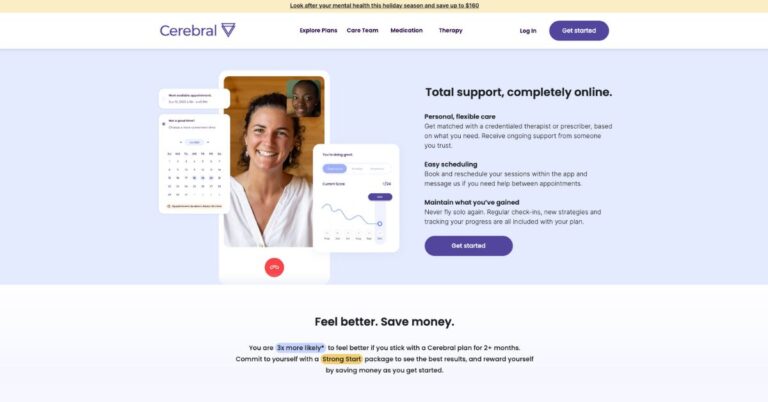In recent years, the conversation surrounding mental health and neurodivergence has become far more open and accepted. In terms of attention-deficit/hyperactivity disorder (ADHD), many adults have begun to reexamine their daily behaviors and their children’s through a newfound understanding of the disorder.
For those who may have wondered if certain personality traits or behaviors may be symptoms of ADHD, obtaining an accurate diagnosis of the disorder can often have positive, life-changing benefits.
Learn how to get diagnosed with ADHD and also how to find the right resources and treatments to address ADHD symptoms.
What is ADHD?
The World Health Organization (WHO) has identified ADHD as one of the most prevalent disorders, affecting millions of children and adults worldwide. Studies have shown that 3–5% of adults and 7–11% of children are affected. However, many experts think the number could go up even more as testing and diagnostic methods improve.
There is a wide range of symptoms, warning signs, and potential treatments for ADHD. ADHD is a mental health condition that causes people to have trouble paying attention, controlling disruptive or impulsive behaviors, and keeping track of their daily schedule.
Why is an ADHD diagnosis important?
If you or someone you know may have a mental health issue, receiving a diagnosis of ADHD from a doctor may be the most important thing you can do to improve your quality of life. Beyond the possibility of treatment or therapy, even an ADHD diagnosis itself can provide perspective and peace of mind as you move forward. Rather than wrongly believing you or your child is flawed, lazy, or easily stimulated, you can instead root your understanding of these behaviors in objective, documented facts.
Also, if a doctor tells you you have ADHD, you can start taking medications or getting other treatments to control your symptoms. This can make a huge difference.
As you decide whether to proceed with testing for yourself or a child, it is important to remember that although ADHD is most commonly diagnosed during childhood, many physicians have begun diagnosing ADHD in adults.
With children, an ADHD diagnosis can improve school performance and aid in friendship development. For adults, diagnosing ADHD often results in stronger relationships, greater success in the workplace, and enhanced self-awareness.
For those looking for a convenient way to get assessed for ADHD from home, many online services now offer ADHD telehealth reviews with licensed professionals. These virtual visits allow you to discuss your symptoms and history with a provider via video call, and potentially get diagnosed and prescribed medication if appropriate. Reading reviews and ratings of different ADHD telehealth providers can help you find a high-quality and trustworthy service.
Common Symptoms of ADHD
ADHD is hard to diagnose because some of its symptoms can look like those of other conditions, like learning disabilities or anxiety disorders. Countless people in situations like yours have found themselves torn between reaching out to a mental health professional or simply living with what they believe to be “normal” struggles.
The primary ADHD symptoms can be broken down into the three categories of inattention, hyperactivity, and impulsivity. Each of these can, in turn, have several symptoms of its own.
If you’ve found six or more symptoms that are seriously affecting you or your child, you should talk to your family doctor or a licensed mental health professional to start the evaluation process needed to receive an ADHD diagnosis.
As you go down the list of ADHD symptoms, we suggest marking down any symptoms you readily recognize in your or your child’s behavior. If you move forward in the diagnostic process, having this list can vastly simplify any potential diagnosis of ADHD. Remember that even though the list below has many of the most common ADHD symptoms, you or a family member may also show other symptoms that are not on the list. If you’re still unclear about the next steps, consider finding a reputable ADHD test to further your understanding.
Inattention
Some of the more commonly ignored or misdiagnosed signs of ADHD include many of these symptoms, which interfere with learning, social interactions, or any activity requiring sustained mental effort. Inattention-related ADHD symptoms may present as:
- Difficulty sustaining attention
- Easily distracted
- Forgetfulness
- Poor organization skills
Hyperactivity
Although often less visible in adult ADHD than in children, hyperactivity symptoms also affect adults. Despite this, many warning signs are often misdiagnosed as symptoms of other disorders, such as seizure disorders or mood disorders. Hyperactivity-related ADHD symptoms may present as:
- Fidgeting or squirming
- Difficulty waiting
- Inability to stay seated
- Excessive talking
Impulsivity
Impulsivity is one of the hardest symptoms of ADHD to spot because it looks like rudeness or impatience to many people. For children and adults with ADHD alike, this often results in difficulty making or sustaining friendships. Impulsivity-related ADHD symptoms may present as:
- Interrupting others
- Makes careless mistakes
- Trouble waiting for one’s turn
- Taking unnecessary risks
How to Receive an ADHD Diagnosis
Once you know more about your own possible ADHD symptoms or the possible ADHD symptoms of a family member, you may want to talk to a doctor about setting up an ADHD evaluation and starting the process of getting ADHD diagnosed.
1. Start with a primary care physician
As with any mental or physical question concerning your health or the health of a loved one, the first step is reaching out to a trusted medical professional. This first meeting often consists of a physical exam intended to rule out underlying causes of the observed symptoms, though this is common for any medical exam. During this step, you should:

- Discuss your symptoms with your primary care doctor: In addition to your medical exam, your doctor will likely conduct a patient interview to inform you of a potential ADHD diagnosis. This interview is where your list of noted symptoms will be most helpful.
- Request a referral to a specialist: Once you’ve discussed your symptoms and possible causes with your doctor, consider requesting the attention of a specialist. Often, you’ll be referred to one or more clinical psychologists or another health professional who attended a medical school specific to mental health issues.
- Schedule an appointment with a mental health professional: Although your primary care physician is an excellent source of information and can often diagnose ADHD themselves, they may suggest a secondary appointment with a specialist.
- Provide a comprehensive medical history: To provide the most accurate assessment and treatment, physicians will often request a complete medical history. Though standard, this is even more crucial for diagnosing ADHD in adults, as being diagnosed with ADHD may reveal the cause of previous medical events or conditions.
2. Conduct a thorough assessment
After you’ve been sent to the right specialist, they will probably compare your symptoms to the diagnostic criteria in the Diagnostic and Statistical Manual of Mental Disorders, also known as the DSM-5. The American Psychiatric Association uses the DSM-5 to give the most up-to-date information about a wide range of conditions. During your ADHD diagnosis, this specialist will guide you through various evaluations, such as:
- ADHD rating scales: While these scales vary between adults and children, ADHD rating scales are a common resource used to diagnose ADHD and advise treatment.
- Behavioral assessments: Most often used to diagnose children, behavioral assessments generally include input from parents, teachers, or counselors. Additionally, behavioral assessments may be used post-diagnosis to gauge treatment success.
- Psychological evaluations: These evaluations focus primarily on intelligence, memory, attention span, and personality and should only be carried out by a licensed psychologist, ideally in a clinical setting.
- Family history evaluations: In both adult and childhood cases, family history evaluations can help document an underlying genetic predisposition to ADHD and explore early environmental risk factors. This information can help inform treatment and increase the likelihood of treatment success.
3. Rule out other mental health conditions
As previously outlined, attention deficit hyperactivity disorder can often go undiagnosed or, sometimes, be misdiagnosed as one of many related disorders. Because of this, accurate testing results are critical to obtaining the best possible outcome for yourself or your child.
If you or your child have previously been diagnosed with one of the following conditions, or if you’ve ever suspected one of the following conditions, speak with your physician about additional testing to rule them out:
- Depression: Sometimes, patients will present with both ADHD and depression, a situation known as comorbid conditions. Nearly 30% of children with ADHD will also be diagnosed with a mood disorder such as depression in their lifetime.
- Anxiety: A common source of physical tics, restlessness, or irritability, anxiety may often be misidentified as the source of various hyperactive or impulsive signs of ADHD.
- Learning disabilities: A broad category concerning any condition which negatively impacts education, learning disabilities are related to, but separate from, ADHD and require different treatments. Clarity about the difference between other learning abilities and ADHD can maximize success in education for you or your child.
- Sleep disorders: Considered by many experts to be a potential sign of ADHD in adults, disrupted sleep patterns may stem from various sources. Although sleep disorders are commonly exhibited by adults diagnosed with ADHD, it is critical to determine whether ADHD is the source or if they are comorbid conditions.
4. Confirm the diagnosis
Once you’ve completed your preliminary ADHD assessment, it’s best to schedule another meeting to go over your results. Confirming that you have ADHD is a big step toward making your life better, but treatment and management are just as important.
ADHD Treatment Options
Determining the appropriate treatment for your ADHD or the ADHD of your child will often depend on how your ADHD presents. Specifically, attention deficit hyperactivity disorder will often be diagnosed as one of three presentations.
For each presentation, doctors must observe six or more of these symptoms in children across two or more environments (such as at home or in the classroom) to establish a diagnosis. At least five of these symptoms must be documented in teenagers and adults.
In the most current resources, these presentations are outlined as follows:
Predominantly inattentive
When it comes to ADHD, “predominantly inattentive presentation” means that most of the symptoms are related to not paying attention, like the ones listed earlier in this article. Broadly, patients exhibiting forgetfulness, a short attention span, or difficulties following directions may fall under this category.
Hyperactive-impulsive
Patients classified as displaying a hyperactive-impulsive presentation will often have more physical indicators. For children, this may often result in fidgeting or squirming, seemingly endless energy, or excessive talking. In adults diagnosed with ADHD, this may present as a habit of interrupting others, impatience, or restlessness.
Combined
Regarding ADHD, “combined presentation” simply refers to a case that fits both the predominantly inattentive and hyperactive-impulsive presentations, with symptoms occurring across age groups in similar fashions as previously outlined.
Medication
Depending on your case, a physician may suggest an ADHD medication to help manage your symptoms. These medications are unique to different patients’ needs but generally fall into one of the following categories:
- Stimulants: The most common treatment for ADHD, prescription stimulants increase dopamine levels in the brain and help diagnosed individuals remain attentive and focused.
- Non-stimulants: Non-stimulant medication may be prescribed as an initial treatment if an individual has an underlying medical condition that could worsen with stimulant use or if traditional stimulants cause an adverse reaction.
- Antidepressants: Primarily prescribed for adults who dislike the effects of common stimulants, antidepressants may help manage mood and increase attention span.
- Combination therapy: This treatment protocol combines stimulants and non-stimulants to improve behavior and reduce medication side effects.
Behavioral therapy
Utilized most often for young children, behavioral therapy aims to manage the effects of ADHD in children through structured interactions with parents and other individuals. Usually, the bulk of such therapy will be carried out by parents who have received specialized training.
- Cognitive behavioral therapy: This type of therapy seeks to condition a patient’s thoughts and behaviors to develop self-esteem and a healthier inner voice. Patients are taught to recognize and counteract negative or harmful thoughts with various techniques.
- Social skills training: For those who struggle to interpret social interactions, social skills training can help children and adults build and maintain healthy relationships.
- Parenting skills training: An enormously beneficial instruction that teaches parents to effectively respond to and manage a child’s ADHD-related behaviors, parenting skill training can have profound benefits for a child’s development but often requires significant effort from the parents.
- Classroom accommodations: With childhood ADHD, contacting your child’s teacher is essential to ensuring academic success. Once informed, schools can provide specialized resources or attention to help manage the disorder.
Alternative therapies
Sometimes, patients may find minimal success with conventional medications and treatments or prefer alternative approaches to managing their condition. In these cases, many beneficial alternative therapies may be employed.
- Exercise: Perhaps the most advantageous alternative therapy is regular exercise. Studies have shown that exercise can upregulate dopamine production, improve attention, and moderate impulsive behavior.
- Mindfulness meditation: In addition to operating as a behavioral therapy, regular meditation has also been shown to increase dopamine and even thicken your prefrontal cortex, the area of the brain responsible for focus and impulse control.
- Acupuncture: Practitioners worldwide have long used acupuncture, a time-tested alternative therapy to ADHD, to moderate the disorder’s adverse effects.
- Nutritional supplements: Many supplements and diet styles may provide relief to those managing an ADHD diagnosis. Specifically, foods that regulate blood sugar, foods containing high levels of omega-3 fatty acids, and melatonin supplements have demonstrated use in managing the condition.
Bottom line
Whether you’re considering ADHD testing for yourself, your child, or a family member, going into the decision with accurate facts and a healthy knowledge of the condition can help ensure success and minimize stress.
No matter when or how you start looking for an ADHD diagnosis, though, we strongly suggest you talk to your primary care doctor so they can help you learn more about possible treatment options. Although speaking to an expert about this condition may seem intimidating, rest assured that they will help connect you to the resources and answers you need to make the most of your situation.
Once you’ve obtained your diagnosis and treatment plan, check back in with your provider to update them on any progress, adverse effects, or concerns. Remember that managing ADHD is a process; you may need time to find the right management methods or medications for your needs.
Additional resources
There are many organizations that can help if you or someone you care about has just been diagnosed with ADHD or if you need more information to get an assessment. Depending on where you live, you may have access to a network of clinical social workers whose job it is to help people with ADHD and other similar mental conditions by giving them information and support.
Getting help from an advanced practice registered nurse (APRN) may also be very helpful. These nurses have undergone specialized training to provide a greater range of services to their patients and often serve as primary care providers. Often, these practitioners will offer their services to individual communities, so consider researching the network as it exists in your area.
Suppose you are not yet prepared to contact a health professional. In that case, there are more and more online resources from government agencies and private companies that you can trust that can help you on your journey. Regardless of your income or time availability, you can be confident that resources exist to suit your situation.
Remember to always check the credentials and consumer feedback for any resources you encounter. While it is essential to both diagnose ADHD and, eventually, receive treatment, neither of these milestones can be safely accomplished without accurate, verified information.
Final Thoughts
Although mental health may have been considered taboo or shameful in past generations, the current conversation surrounding these conditions has evolved into an accepting, inclusive space.
Remember that although many people and organizations are ready and willing to help, the first step toward results is yours.
Frequently Asked Questions
Where can I find trustworthy ADHD quizzes?
Though many credible ADHD quizzes exist online, always look for one that uses the Diagnostic and Statistical Manual of Mental Disorders to verify its results. Even then, no self-test should ever be taken as a replacement for a formal clinical assessment. Although a high-quality quiz may help provide insight, you should always consult a physician when seeking a diagnosis.
Is medication the only treatment for ADHD?
Many treatments exist to address ADHD, and certain ones may be more successful than others for specific people. Because of this, it is best to speak with your physician to explore all options and select the best route for your situation. If you have a specific aversion to taking medications or stimulants, you can still find other solutions to help manage your ADHD.
What are the 3 categories of ADHD symptoms?
The three categories of ADHD symptoms are behavioral issues related to impulse control, hyperactivity, and inattention. Although symptoms within these categories affect everyone differently and may develop uniquely depending on environmental factors, how a person’s ADHD presents, and the patient’s age, these three general areas are universally used by practitioners worldwide to diagnose the disorder.
Is it harder to diagnose ADHD in adults?
Many experts think that ADHD in adults is a more complicated and nuanced problem, so many doctors say that it is much harder to diagnose the disorder in adults. Additionally, adults may exhibit several other mental health conditions, such as anxiety or depression, which can complicate a diagnosis. Despite this, a formal evaluation can often yield enormous benefits for adults seeking answers.
Our Editorial Team, with a rich background in educational content creation, prioritizes accuracy and quality in every article. We are committed to producing expert content tailored to meet the academic needs of college and high school students, ensuring they receive well-researched and trustworthy information for their educational journey.







